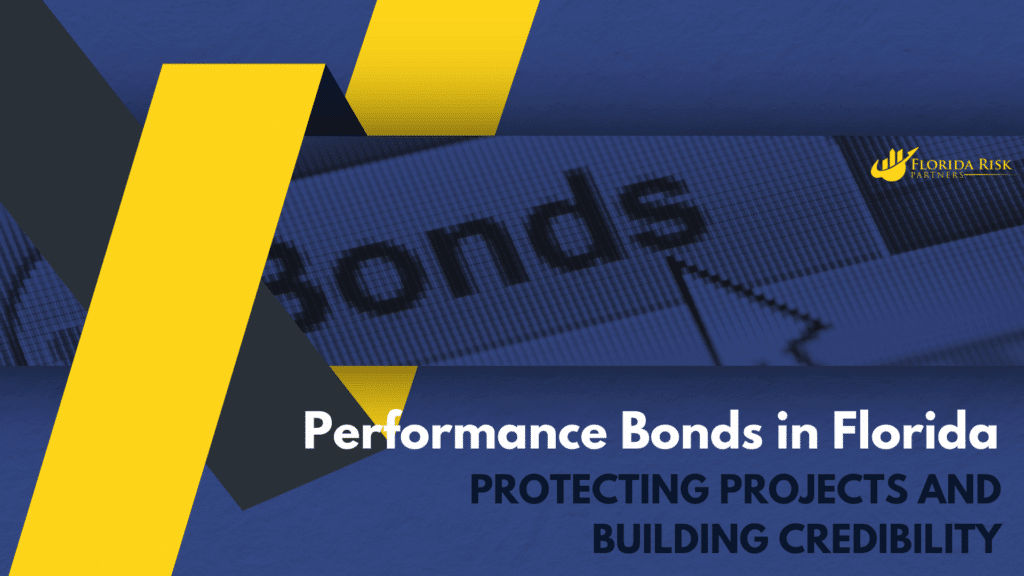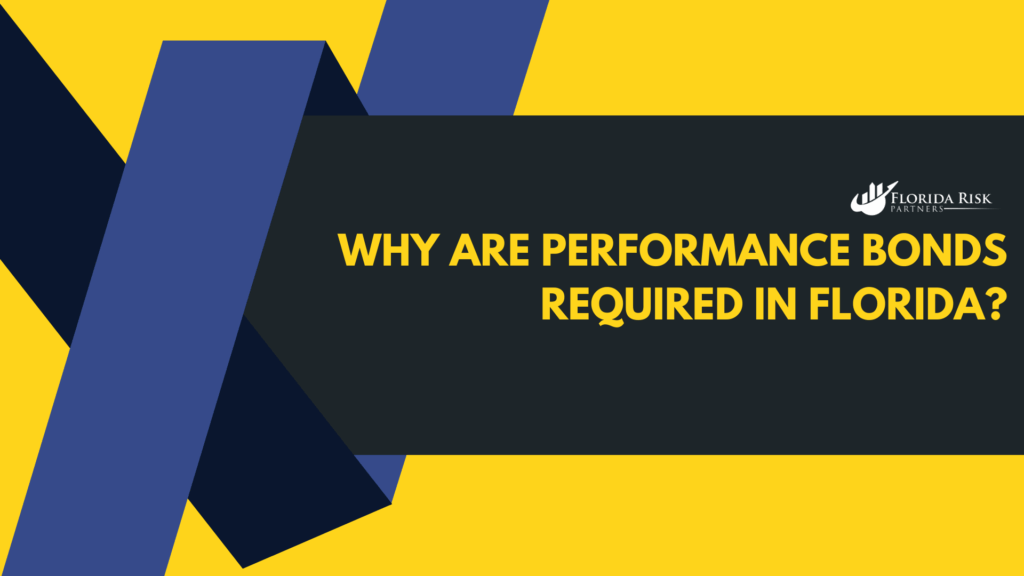-
Main Office: 1434 E. Bloomingdale Ave Valrico, FL 33596-6110
-
Phone: (888) 601-6660
-
Email: info@floridariskpartners.com

Construction projects are filled with uncertainty—weather delays, material shortages, labor issues, or even a contractor unexpectedly going out of business. That’s why project owners, whether public agencies or private developers, rely on a critical financial tool to reduce their risk: the performance bond. For contractors in Florida, understanding how performance bonds work, when they’re required, and how to qualify for them is essential not only for legal compliance but also for accessing larger and more profitable work.
In this article, we’ll unpack everything you need to know about performance bonds in Florida—from the legal statutes that require them to how they affect your business operations and reputation. We’ll also explain how Florida Risk Partners simplifies the bonding process with our 24/7 quote/bind/issue platform, giving you the tools to bid, win, and perform with confidence.
What Is a Performance Bond?
A performance bond is a type of surety bond in Florida that guarantees a contractor will complete a project according to the terms of a contract. It’s a three-party agreement between:
- The principal – that’s you, the contractor
- The obligee – the project owner (typically a government agency or private developer)
- The surety – the company providing the financial guarantee
If the contractor defaults—by failing to finish the job, violating the contract, or walking off-site—the surety will step in to ensure the project is completed. This could mean hiring a replacement contractor, funding the completion of the project, or reimbursing the obligee for damages, up to the bond’s penal sum.
Unlike insurance, the surety is not taking on the risk permanently. If they pay out on a claim, they will seek reimbursement from the contractor. That’s why obtaining a performance bond requires a financial vetting process, and why contractor bonding in Florida is often viewed as a sign of fiscal strength and business professionalism.
Why Are Performance Bonds Required in Florida?
In Florida, performance bonds are not just a best practice—they are legally required for most public construction work. The authority for this comes from Florida Statute §255.05, commonly referred to as the Little Miller Act, which mirrors the federal Miller Act and governs bonds on public works projects.
Under this statute:
- Any contractor entering into a public construction contract with a state agency or political subdivision (city, county, school district, etc.) for more than $100,000 must furnish a performance bond.
- The bond must be issued for 100% of the contract value, ensuring that the public entity will not be left exposed to losses if the contractor defaults.
- The bond must be recorded in the official records of the county where the project is located, making it accessible to subcontractors and suppliers.

The purpose of this law is to protect taxpayers and public assets by ensuring that projects such as schools, roads, municipal buildings, and other infrastructure will be completed—even if the contractor encounters financial or operational troubles. Without a performance bond, a stalled project could leave the public footing the bill for delays or cost overruns.
Many private construction contracts in Florida also require performance bonds, particularly when projects are large-scale or financed by banks or institutional lenders. In fact, many commercial lenders will not fund a project unless the contractor provides performance and payment bonds, which serve as built-in safeguards for the investment.
So whether you’re building a new fire station in Orlando or managing a luxury condo build in Naples, chances are high that the job will require a performance bond.
How Performance Bonds Work in Practice
Let’s say you’re a Florida general contractor and you’ve been awarded a $2.5 million public works contract to renovate a community center in West Palm Beach. Before you can begin work, the city requires you to submit a performance for the full contract amount—$2.5 million.
You contact your bond agent and submit a bonding application. After reviewing your financials, project history, and credit standing, the surety agrees to issue the bond. You pay a one-time premium (typically 1% to 3% of the contract value), and the bond is issued and recorded with the county.
Now let’s say midway through the project, your company experiences a cash flow crisis due to an unrelated job that went south. You stop paying subcontractors, and eventually your crew walks off the job. The city, now facing an incomplete project, files a claim on your performance bond.
At this point, the surety investigates. If it finds you have indeed defaulted on your contract, it has several options:
- Finance you to complete the project (sometimes the cheapest and fastest fix)
- Hire another contractor to finish the work
- Reimburse the city for the additional cost to complete the job
Either way, you are responsible for reimbursing the surety for any losses paid out. That’s the key distinction between bonding and insurance—the contractor is still financially liable for the performance of the contract.
Benefits of Performance Bonds for Contractors
While performance bonds protect project owners, they also offer significant benefits to contractors:
1. Access to Larger Projects
Without bonding capacity, you can’t even bid on many public and private jobs in Florida. Having the ability to secure a performance bond shows that you’re a serious, stable, and scalable operation. It unlocks doors to bigger contracts, repeat business, and long-term growth.
2. Builds Credibility and Trust
Project owners view bonded contractors as more trustworthy because a third-party surety has evaluated and endorsed their ability to deliver. This can be a deciding factor when competing for contracts, even in the private sector.
3. Opportunity to Establish a Track Record
Once you successfully complete bonded projects, you build a reputation with both project owners and your surety. That makes it easier to increase your bonding capacity over time, which further expands your business opportunities.
4. Competitive Differentiation
In Florida’s competitive construction landscape, having bonding capacity—and making it clear that you’re bond-ready—can give you an edge over smaller or less-organized firms.
What Do Florida Sureties Look for Before Issuing a Performance Bond?

When underwriting a performance bond, sureties want to be confident that you can complete the job on time, on budget, and to specification. Here are the main factors they review:
Financial Health
Sureties will request:
- CPA-prepared or internally generated financial statements
- Balance sheet and income statement
- Personal financial statements for owners
- Proof of working capital and equity
Strong liquidity, low debt, and healthy margins increase your bonding capacity.
Experience and Track Record
Sureties want to see that you’ve successfully completed similar projects. If you’re bidding on a $5 million commercial build, they’ll look for examples of jobs of comparable size and complexity.
Work-in-Progress (WIP)
A WIP schedule helps the surety assess whether you’re overextended. If you’re juggling too many large projects, they may be hesitant to back another one.
Project Specifics
They’ll analyze the contract terms, scope of work, payment schedule, and any risk factors. Jobs with fuzzy specs, aggressive schedules, or uncertain funding may require more scrutiny—or higher premiums.
Management Quality
A contractor with strong leadership, internal controls, and industry knowledge is more likely to receive favorable terms. Sureties want to know they’re backing a team that can handle the job professionally and efficiently.
What Happens if a Claim Is Filed?
A performance bond claim can have serious consequences. Not only will you be liable for repayment, but your reputation with the surety may suffer—making future bonds harder (or more expensive) to obtain.
That’s why it’s critical to:
- Stay in regular communication with your surety
- Notify them early if a project starts to go sideways
- Maintain good financial records and project oversight
In some cases, sureties will step in before a claim is filed to help prevent a default. They might offer financial support, mediation, or project management assistance. That’s another reason to build a strong, proactive relationship with your bond provider.
Florida Risk Partners Simplifies the Bonding Process
Securing a performance bond can be a headache if you’re working with an agent who isn’t experienced in construction bonding—or worse, one who only works 9 to 5. That’s why Florida Risk Partners developed a 24/7 online quote/bind/issue platform that gives you the speed and flexibility you need to stay competitive in Florida’s fast-moving construction market.
Here’s what sets us apart:
- Anytime access to our digital bond portal, allowing you to initiate or check on a performance bond request anytime, day or night
- Streamlined application process that guides you through what documentation is required
- Fast response from our team of experienced surety professionals who understand the Florida market
- Transparent pricing and clear communication every step of the way
Whether you’re an established contractor or just getting into public work, we can help you build or expand your bonding program to match your business goals.
Recap: Why Performance Bonds Matter in Florida
To succeed as a contractor in Florida, you need more than tools, trucks, and talent—you need bonding capacity. A Florida performance bond is your ticket to public projects, large-scale private jobs, and lasting client trust. It protects your clients while helping you build credibility, grow your business, and compete for the contracts that matter most.
Understanding the legal requirements under Florida law, managing your financials effectively, and building a relationship with a trusted bond agent are all crucial steps in maintaining your ability to bond.
And when you’re ready to take the next step—or need a performance bond quickly—Florida Risk Partners is here to make it easy. Our 24/7 quote/bind/issue platform ensures you’ll never miss a deadline due to paperwork. We provide both the technology and the expertise to help Florida contractors navigate the world of bonding with confidence.
So whether you’re pursuing your first public contract or scaling up to handle multimillion-dollar jobs, make sure your performance bonding game is strong. And remember—you don’t have to do it alone. Florida Risk Partners has your back.
Call Us Or
Schedule an Appointment
Select an agent below to view our online calendars and select a day and time that works best for you or call us directly at 888-601-6660. When you use our online calendars, you will receive an email with more information.



